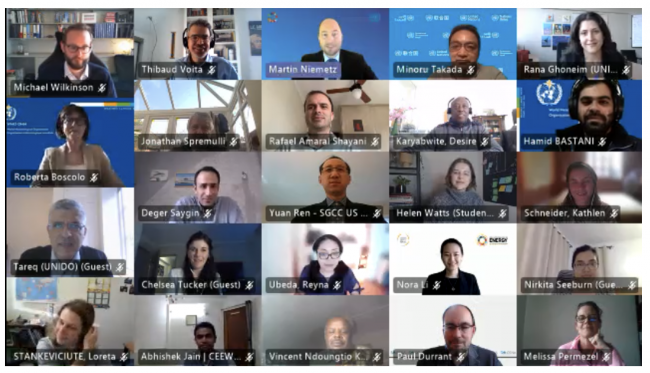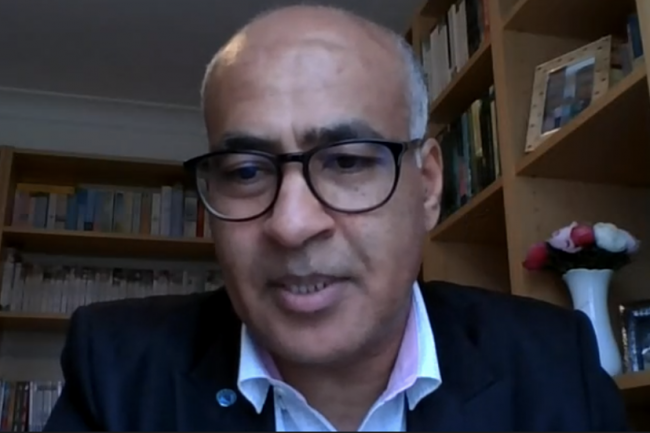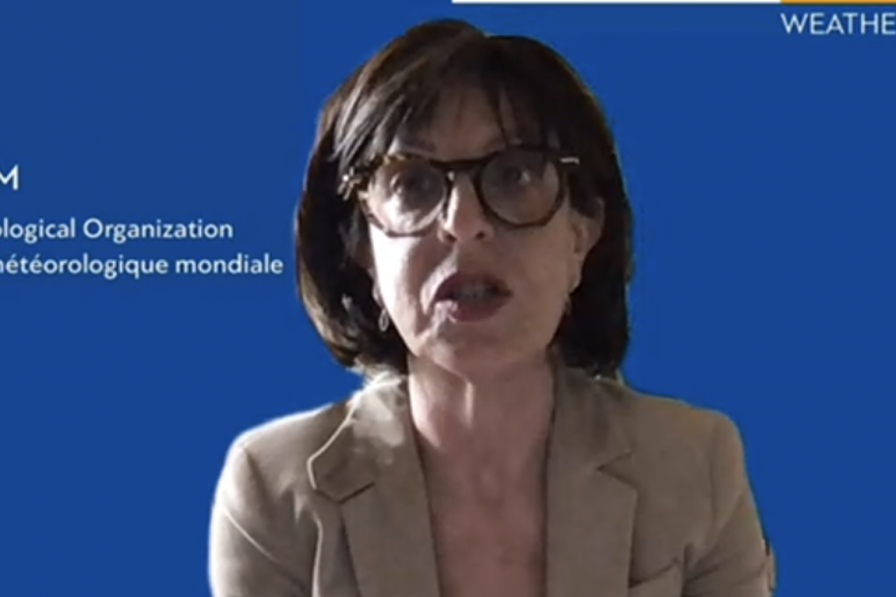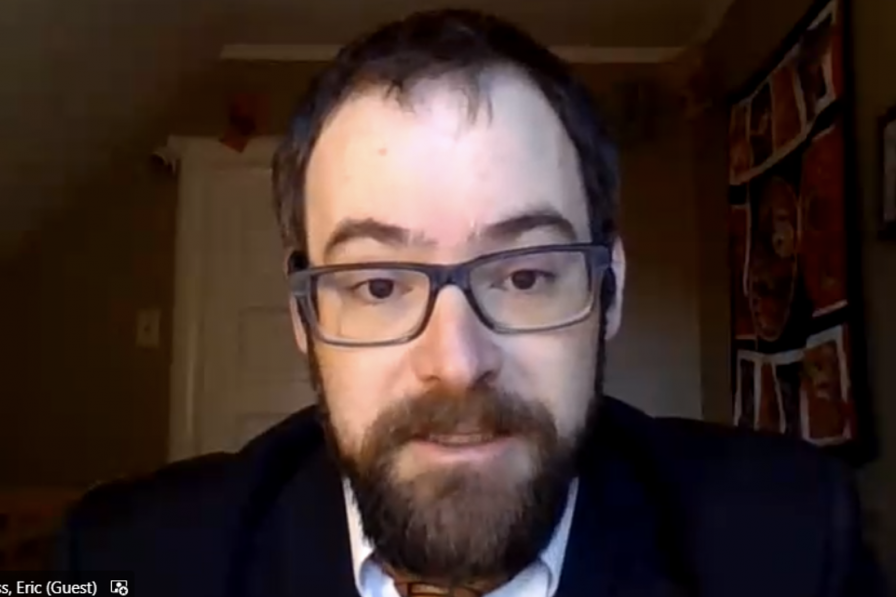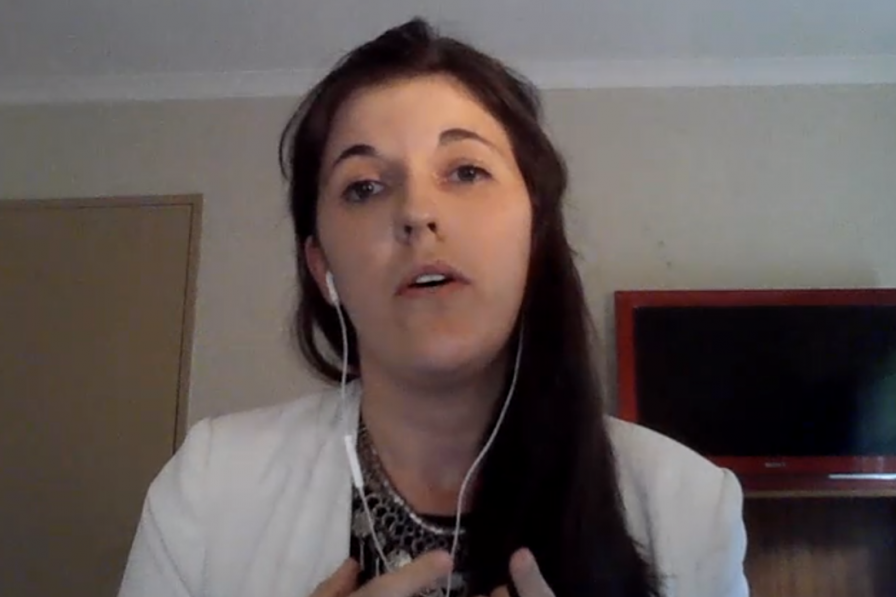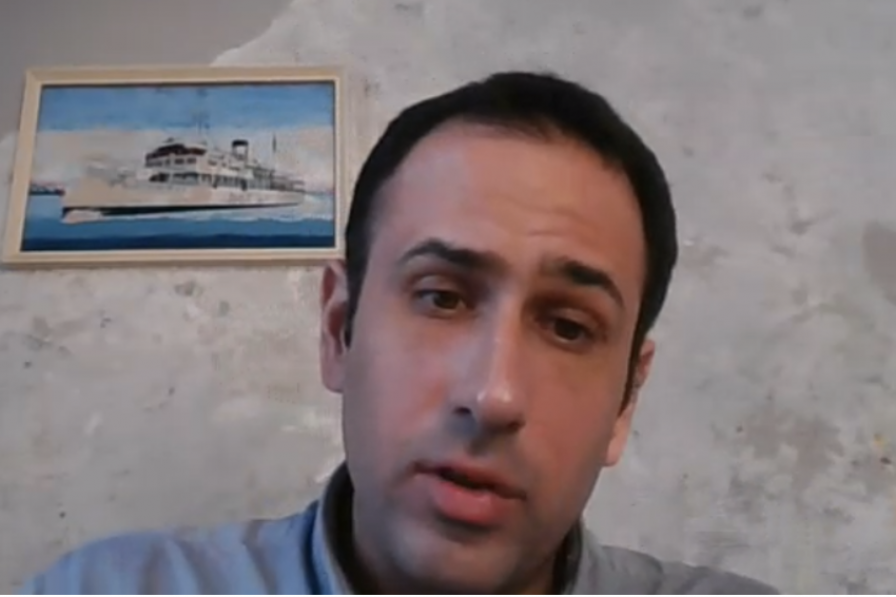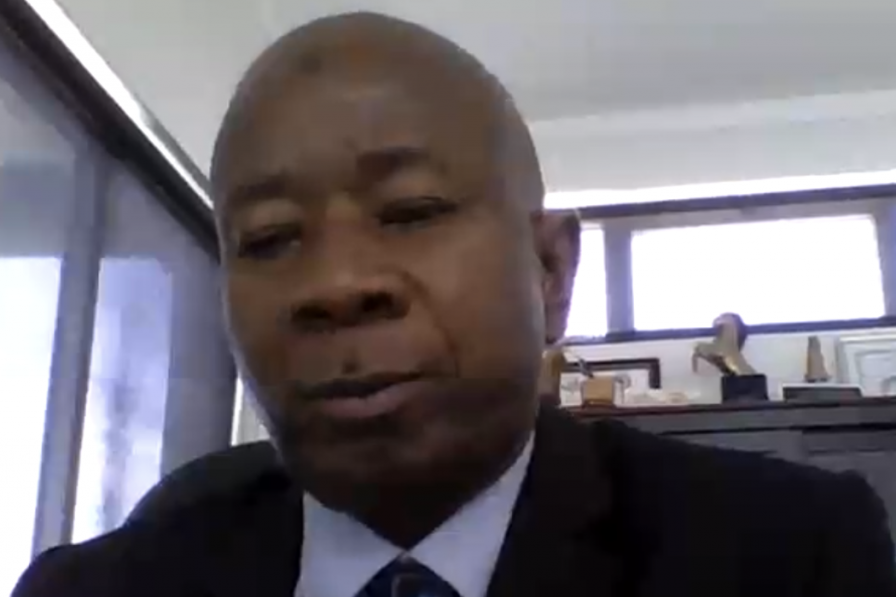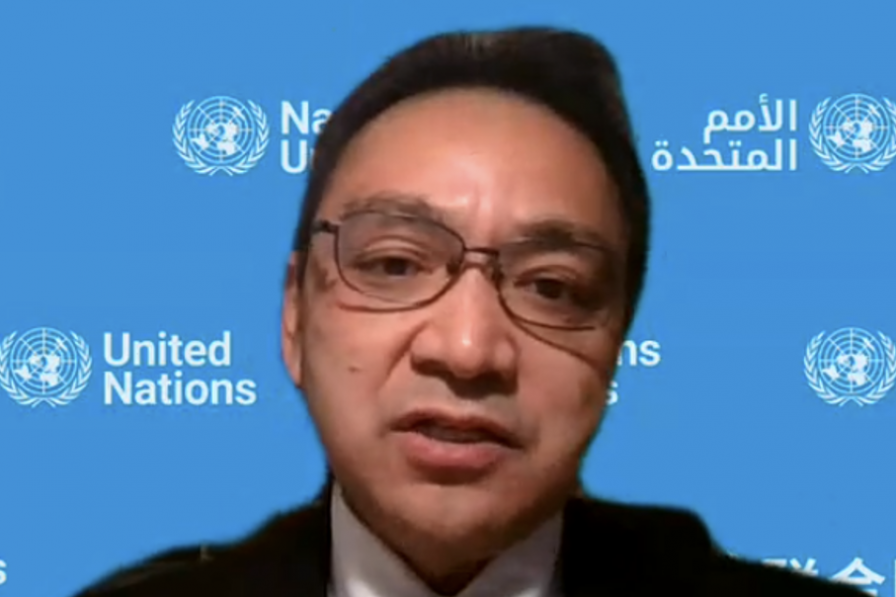The first meeting of the Technical Working Group on Innovation, Technology, and Data discussed ways to radically change the energy system to reach net zero emissions by 2050 while leaving no one behind. The group grappled with diverging views on the future role of fossil fuels and emphasized the need to inclusively build skills not only for technical work but also for leadership roles.
The Working Group is one of five groups that are preparing recommendations to be presented to the High-Level Dialogue on Energy, which will convene at the summit level in September 2021. This Working Group is being co-led by three UN entities: the UN Industrial Development Organization (UNIDO), the Food and Agriculture Organization of the UN (FAO), and the UN Human Settlements Programme (UN-Habitat). The Global Champions for the theme of this working group are Mauritius and Morocco, with the Russian Federation in a supporting role.
Opening Statements
Tareq Emtairah, Director, Department of Energy, UNIDO, said innovation is needed in four areas: policy, governance, behaviors, and business practices. He said creativity will be needed to achieve the agreed goals in the short time remaining.
Zitouni Ould-Dada, Deputy Director, Office of Climate Change, Biodiversity and Environment, FAO, suggested a broad approach to innovation to include not only technology but also finance, building capacity, and “changing our mindsets.”
Andre Dzikus, Head of Urban Basic Services, UN-Habitat, explained that smart cities, smart grids, and smart buildings rely on intensive use of data. To take advantage of these technologies, he said cities must be able to generate the needed data.
Minoru Takada, Team Leader, Secretariat of the High-level Dialogue on Energy, UN Department of Economic and Social Affairs (DESA), said the working group should identify ways to leverage technology, data, and innovation to reach two goals: achieve SDG 7 by 2030 and reach net zero emissions by 2050. The said the reports of each technical working group will be important inputs for the High-level Dialogue on Energy “and beyond,” informing UNFCCC COP 26 and guiding the mobilization of action in years to come.
Rana Ghoneim, Chief, Energy Systems and Infrastructure Division, UNIDO, presented the concept note prepared by the co-leading agencies of the working group. Noting the cross-cutting nature of this group’s theme, she suggested a focus on links with several areas: enabling technologies; financial and social innovation; digital technologies and GIS; innovation in policy and governance; and capacity and skills.
Open Discussion
During the open discussion, members of the Thematic Working Group, the Global Champions for the theme, and UN-Energy member organizations offered suggestions for the recommendations the Working Group will develop.
The exchange of views began and ended with a call to change the pace and move beyond incremental improvements. One speaker said the mindset needed to reach net zero by 2050 is “quite different” from the current narrative and requires a strong focus on acceleration. The targets for 2030 are a stepping-stone to 2050, but net zero cannot be achieved just by increasing efficiency, reducing emissions, or making fossil fuels cleaner. Rather, it requires radical change in all aspects of the energy system and beyond, including a tripling of power generation worldwide.
Some pressed for investment in research and development, suggesting that only half of the technologies to achieve the energy goals have been invented. One speaker said ship owners are offering USD 5 billion for research and development to achieve the shipping propulsion revolution and create technology pathways to develop zero-carbon ships.
Another speaker challenged the notion that “the technology is not there,” highlighting distribution challenges in Africa and the need to decentralize the creation of liquid fuels such as methanols and diesels from waste and enabling their creation at a smaller scale by making them modular and simpler to enable SMEs to use them. Speakers also differed on the place of fossil fuels in the roadmap to SDG 7 and net zero emissions. A few speakers proposed focusing on clean energy and renewables, rather that on making the use of fossil fuels more efficient. Others suggested focusing on how to make oil, gas, and nuclear energy sources more environmentally friendly, and said the group should be “technology neutral” and prioritize lower emissions, not just renewable sources.
Speakers discussed the cross-cutting nature of innovation, technology, and data. They said that, since energy is an enabler of other issues – transport, industry, healthy, education, and agriculture, among others – this technical working group should focus on outcome-based narratives, and energy’s “multiple benefits and multiple outcomes.” Some speakers noted that a focus on better incomes, jobs, and resilient livelihoods will make the group’s recommendations widely appealing.
A speaker said skills and capacity are part of the context in which innovation works, but skills development is “underacknowledged and underfinanced.” With regard to skills and training, speakers said:
- Training a critical mass, including in rural communities, would help make the energy sector itself more inclusive;
- Local jobs should include higher-level jobs, however, this is a long-term process that falls outside most funders’ cycles;
- Project- and problem-based learning can help build creative, innovative skills.
- Skill building is critical to give young people attractive career opportunities in clean energy, and youth are “a precondition” to building and sustaining momentum to 2030 and beyond.
Several interventions focused on infrastructure. One speaker said Africa is way behind and the Group’s report is likely to show a “clear distinction between Africa and the west.” Infrastructure for clean transportation was also discussed, with a speaker noting that growth in motor vehicles is the biggest issue in Asia, as air pollution poses health problems and damages the “economic environment.”
On policy and governance frameworks to support technology, innovation, and data, a participant said local utilities in island nations see the need for more renewable energy, greater energy efficiency, clear regulatory frameworks, and secondary legislation to enable high-tech penetration of renewables in island grids.
Participants also stressed the need for an energy transition that is inclusive even as it “leapfrogs,” so as not to increase inequalities or leave anyone behind.
On finance, speakers said: stimulus packages for COVID-19 recovery could be used to support decarbonization, including in hard-to-abate sectors; banks could be incentivized to create new financing products; and countries that have removed taxes on imports of renewable energy technologies have seen increased energy access and off-grid uptake.
Conclusion and Next Steps
Vincent Kitio, Chief, Urban Energy Unit, Urban Basic Services Branch, UN-Habitat, said the discussion had highlighted that: each innovation is context-based; energy enables multiple outcomes such as job creation, water, food, health, and mobility; and ensuring universal energy access by 2030 and ultimately achieving net zero emissions will require both strong commitments and a paradigm shift.
As for next steps, an annotated outline will be circulated by 12 March for comments, and the first draft of the report will be sent to members by 9 April. The group will hold their second meeting during the week of 12 April to review the draft. Cross-technical working group discussions will take place during the week of 26 April, followed by a final meeting during the week of 17 May to endorse the final report and matrix of actions.
The first meeting of the Technical Working Group on Innovation, Technology, and Data convened virtually on Tuesday, 2 March 2021, from 8:00 to 10:30 am EST (GMT-5), with 61 participants.
To receive continuing coverage of this event delivered to your inbox, subscribe to the ENB Update newsletter.
Selected Photos
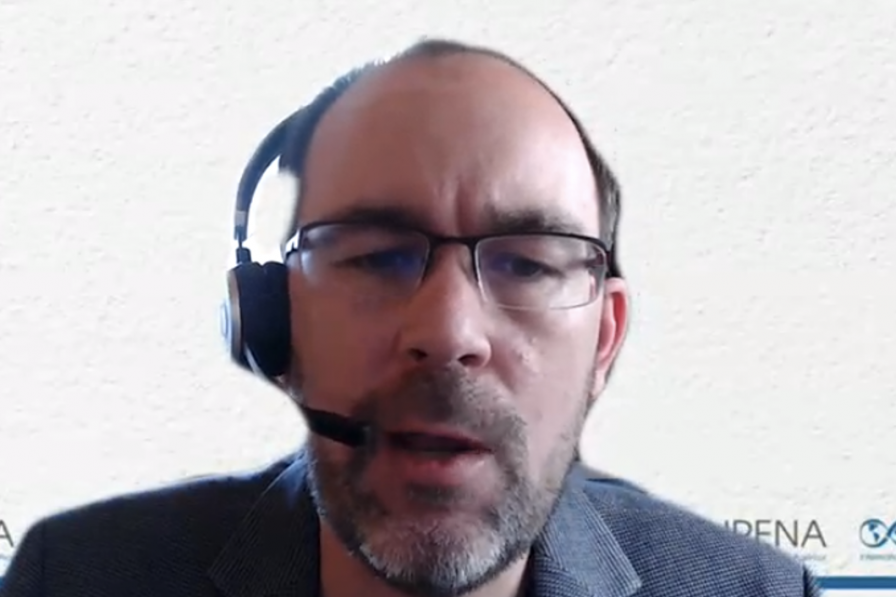
Paul Durrant, Head of End-use Sectors & Bioenergy, Innovation & Technology Centre, International Renewable Energy Agency (IRENA)
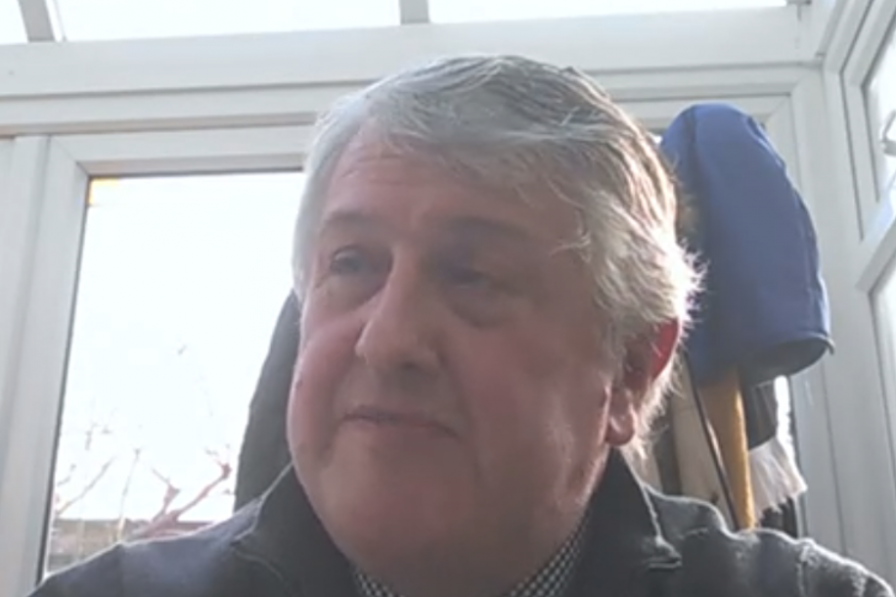
Jonathan Spremulli, Principal Director (Marine), Head of Marine Shipping, International Chamber of Shipping

Jiska de Groot, Skills and Enterprise Development Manager, African Climate and Development Initiative, University of Cape Town
